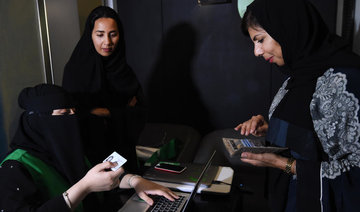DUBAI: History was made in 2018, when women in Saudi Arabia were permitted to drive for the first time since 1957. As the world watched female motorists across the Kingdom celebrate, a less visible set of women also quietly stepped out of the shadows and revved up their engines. “Women were interested in motorbikes, but they couldn’t
ride openly in Saudi Arabia,” said Zahra AbuAli, founder of social media group Saudi Women Riders and co-founder of The Litas Khobar, a Saudi chapter of the international all-female motorcycle group The Litas.
“It was an underground scene. They used to wear baggy clothes, hide their hair under helmets, and ride at the center of (mixed) groups. Some girls have licenses from Bahrain, some have bikes but no licenses, and some ride with their husbands.”
AbuAli, a 28-year-old Saudi national, learnt to ride a motorbike last year while working in Dubai.
“I just wanted to try something new, and once I started, I couldn’t stop. Cars in Saudi were only a man thing, but that didn’t mean they’re made only for men,” she said.
The horsepower thrill was amplified when the biomedical engineer began to ride her Harley 883 Sportster with Lara Tarabay Saab, founder of The Litas Dubai, the first chapter of the motorcycle collective in the Middle East.
Saab, who is from Lebanon, said that she founded the group to alter perceptions and help female bikers find each other and ride together as a sisterhood.
“My vision is to make our community as women bikers in the Middle East visible to the world. I don’t want them to think of us in stereotypes,” she explained.
The Litas Dubai currently features 10 women from Saudi Arabia, Jordan, Bahrain, Palestine, Morocco, Russia and the UAE. The group includes police officers, doctors, artists, engineers, management professionals and mothers.
“Thirteen years ago, if I stood anywhere with my bike, people would come and speak to me in English and be surprised when I answered in Arabic,” Roqayya Abdullateif, 37, said.
The Emirati police officer said that she mastered the handlebars simply by watching her brothers riding bikes. “I saw girls sitting in the back of the bike, and I said why not sit in the front?”
Saab, who initially rode as part of mixed groups in the UAE, said that she also formed the sisterhood as a support system in a male-dominated sport. “Our culture dictates a few things for us. Typical lady behavior wouldn’t be to be on a motorcycle, so it wasn’t easy (for me) at all.
“I was in Italy with my husband, and I wanted to ride a scooter. He said, ‘No, you can’t.’ When I’d ask him to teach me, he’d say ‘It’s very heavy, you can’t even lift it.
“This triggered a lot in me in terms of my sense of existence, freedom of choice and power.”
Saab, a mother of two and a marketing director, now cruises on a Sportster 1200cc, but her journey to this point involved attending 7 a.m. lessons before heading to work.
“I had to come to my husband to sign the form to give me approval … because I’m on his sponsorship,” she said. “He said it’s dangerous and that I should talk to my father first. (But) I said there’s no way I’m not doing this.”
Saab, who also co-founded The Litas Lebanon, is UAE ambassador for the Women’s International Motorcycle Association and Middle East ambassador for the Women Riders World Relay (WRWR).
“We have a lot of women who message us with questions about motorcycles or asking where we learnt to ride,” Saab said. Set to take place in Dubai in 2020, the WRWR is one of the largest global motorcycle events for female riders, created to raise awareness of women across all spheres of motorcycling. The UAE and Oman are the only Middle Eastern states included in the tour of 80 countries, with Dubai marked as the final destination. Saab and her pack are already holding information sessions for the event.
“This is for women’s empowerment because models who pose on bikes are not lady bikers,” she said.
This report is being published by Arab News as a partner of the Middle East Exchange, which was launched by the Mohammed bin Rashid Al Maktoum Global Initiatives and the Bill and Melinda Gates Foundation to reflect the vision of the UAE prime minister and ruler of Dubai to explore the possibility of changing the status of the Arab region.


























